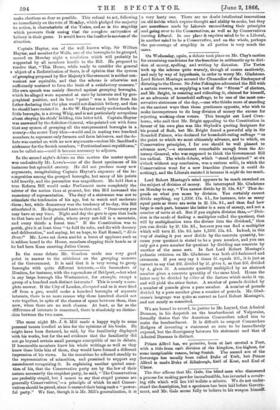On Weidaetslay, again, a debate took place on Mr. Clay's
motion for examining candidates for the franchise in arithmetic up to divi- sion of money, spelling, and writing by dictation. The Tories took up the scheme quite warmly, though of course cautiously, and only by way of hypothesis, in order to worry Mr. Gladstone. Lord Robert Montagu accused the Chancellor of the Exchequer of dictating to the House. Sir John Pakington advocated the Bill with a certain reserve, as supplying a test of the " fitness " of electors, and Mr. Bright, in resisting and ridiculing it, claimed for himself, as an advocate of household suffrage, to be one of the most con- servative statesmen of the day,—one who thinks more of standing on the ancient ways than those gentlemen opposite, who wish to make incompetence to do long division of money the excuse for rejecting working-class voters. This brought out Lord Oran- borne, who said that Mr. Bright appealing to the Constitution in favour of his own plan was like Shylock's quoting Scripture for his pound of flesh, but Mr. Bright found a powerful ally in Sir Roundell Palmer, who declared for household-rating suffrage "as the point to which we must ultimately advance, and to which, on Conservative principles, I for one should be well pleased to advance now,"—a statement remarkable enough from the At- torney-General, who was supposed to think the Government Bill too radical. The whole debate, which "stood adjourned" at six o'clock without any conclusion, was a curious moil in which the Conservatives went for a new franchise (because it could do nothing), and the Liberals resisted it because it might do too much.






























 Previous page
Previous page